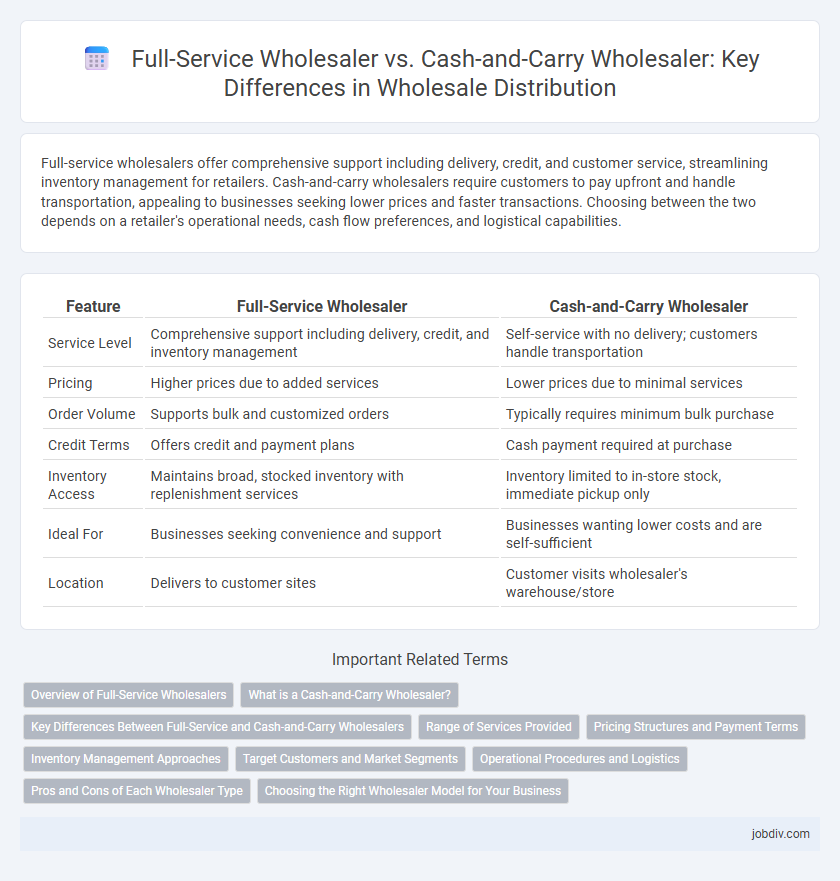Full-service wholesalers offer comprehensive support including delivery, credit, and customer service, streamlining inventory management for retailers. Cash-and-carry wholesalers require customers to pay upfront and handle transportation, appealing to businesses seeking lower prices and faster transactions. Choosing between the two depends on a retailer's operational needs, cash flow preferences, and logistical capabilities.
Table of Comparison
| Feature | Full-Service Wholesaler | Cash-and-Carry Wholesaler |
|---|---|---|
| Service Level | Comprehensive support including delivery, credit, and inventory management | Self-service with no delivery; customers handle transportation |
| Pricing | Higher prices due to added services | Lower prices due to minimal services |
| Order Volume | Supports bulk and customized orders | Typically requires minimum bulk purchase |
| Credit Terms | Offers credit and payment plans | Cash payment required at purchase |
| Inventory Access | Maintains broad, stocked inventory with replenishment services | Inventory limited to in-store stock, immediate pickup only |
| Ideal For | Businesses seeking convenience and support | Businesses wanting lower costs and are self-sufficient |
| Location | Delivers to customer sites | Customer visits wholesaler's warehouse/store |
Overview of Full-Service Wholesalers
Full-service wholesalers provide a comprehensive range of services including inventory management, delivery, credit facilities, and marketing support, making them a preferred choice for retailers seeking convenience and business growth. They maintain extensive product lines and often engage in promotional activities to help retailers increase sales. Unlike cash-and-carry wholesalers, full-service wholesalers offer personalized assistance and flexible payment options, enhancing supply chain efficiency and customer relationships.
What is a Cash-and-Carry Wholesaler?
A cash-and-carry wholesaler sells products directly to retailers or business customers who pay in cash and handle their own transportation, eliminating credit risk and delivery costs for the wholesaler. These wholesalers typically operate large warehouses where buyers select and purchase goods in bulk, emphasizing efficiency and cost savings. Unlike full-service wholesalers who offer delivery, credit, and inventory management, cash-and-carry wholesalers focus on quick, self-service transactions.
Key Differences Between Full-Service and Cash-and-Carry Wholesalers
Full-service wholesalers provide comprehensive services including product storage, delivery, credit facilities, and marketing support, enhancing customer convenience and fostering long-term business relationships. In contrast, cash-and-carry wholesalers operate on a self-service basis, requiring customers to pay upfront and handle transportation, which reduces operational costs and leads to lower prices. These key differences impact inventory management, customer service levels, and the overall supply chain efficiency within wholesale distribution.
Range of Services Provided
Full-service wholesalers offer a comprehensive range including inventory management, delivery, marketing support, and credit services, catering to diverse client needs. Cash-and-carry wholesalers specialize in self-service bulk sales with minimal additional services, focusing on quick transactions and cost efficiency. The choice depends on whether businesses prioritize extensive support or streamlined purchasing processes.
Pricing Structures and Payment Terms
Full-service wholesalers typically offer flexible pricing structures, including volume discounts, credit options, and negotiated payment terms tailored to long-term client relationships. In contrast, cash-and-carry wholesalers maintain fixed, often lower prices with immediate payment requirements, emphasizing quick transactions and minimizing credit risk. These differences impact customer buying behavior, with full-service wholesalers supporting larger, credit-based orders and cash-and-carry focusing on smaller, upfront purchases.
Inventory Management Approaches
Full-service wholesalers maintain extensive inventory levels to provide a broad product range and fulfill diverse customer needs efficiently, leveraging advanced inventory management systems for real-time tracking and demand forecasting. Cash-and-carry wholesalers typically hold limited stock, focusing on high-turnover items to reduce holding costs and facilitate quick customer self-service transactions. Inventory optimization strategies in full-service wholesaling emphasize replenishment accuracy and stock availability, whereas cash-and-carry models prioritize rapid stock turnover and simplified inventory control.
Target Customers and Market Segments
Full-service wholesalers primarily target retailers and businesses requiring extensive product ranges, value-added services, and customized delivery options, catering to diverse market segments including supermarkets, specialty stores, and service providers. Cash-and-carry wholesalers focus on small to medium-sized retailers and institutional customers seeking bulk purchases at lower prices without additional services, serving fragmented market segments such as convenience stores, restaurants, and local resellers. Market segmentation for full-service wholesalers often includes sectors demanding inventory management support, whereas cash-and-carry wholesalers excel in supplying high-turnover, price-sensitive buyers.
Operational Procedures and Logistics
Full-service wholesalers handle order processing, inventory management, and delivery logistics, ensuring streamlined operations from purchase to customer receipt. Cash-and-carry wholesalers focus on self-service sales where buyers select products directly from warehouses, reducing operational overhead by eliminating delivery logistics. The distinction in operational procedures impacts inventory turnover rates and supply chain efficiency within wholesale distribution channels.
Pros and Cons of Each Wholesaler Type
Full-service wholesalers offer comprehensive services including delivery, credit, and inventory management, enhancing customer convenience but often at higher prices and minimum order requirements. Cash-and-carry wholesalers provide lower prices with the benefit of immediate product availability, requiring buyers to handle transportation and payment upfront, which limits flexibility. Choosing between these models depends on the buyer's need for service support versus cost savings and purchasing autonomy.
Choosing the Right Wholesaler Model for Your Business
Selecting the right wholesaler model depends on your business's inventory needs, budget, and service expectations. Full-service wholesalers provide extensive services, including delivery, credit, and product variety, ideal for businesses seeking convenience and support. Cash-and-carry wholesalers cater to buyers willing to purchase in-person and pay upfront, offering cost savings and efficiency for businesses with immediate stocking requirements and self-managed logistics.
Full-Service Wholesaler vs Cash-and-Carry Wholesaler Infographic

 jobdiv.com
jobdiv.com